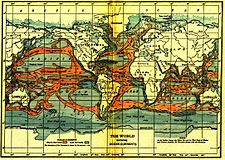Oceanography
From Wikipedia, the free encyclopedia.
Oceanography (from Ocean + Greek γράφειν = write), also called oceanology or marine science is the study of the Earth's oceans and seas. Oceanographers study a diverse range of topics such as plate tectonics to ocean currents to marine organisms. These wide range of topics are reflective of the types of backgrounds that oceanographers come from: Chemistry, Biology, Physics and Geology.
Contents |
Branches of Oceanography
There are generally five branches of oceanography:
- Biological oceanography or marine biology, the study of the plants and animals (biota) of the oceans and their ecological interaction;
- Chemical oceanography, the study of the chemistry of the ocean;
- Geological oceanography, the study of the geology of the ocean floor including plate tectonics;
- Meteorologic oceanography, the study of the interactions of the atmosphere and the ocean in the hydrosphere; and
- Physical oceanography, the study of the physical attributes of the ocean (such as its temperature-salinity structure, waves, and currents).
The five branches tend to stem from the fact that many oceanographers are trained in the exact sciences and then specialise in oceanography.
History of oceanography
Early exploration of the oceans was limited to its surfaces and the few creatures that fishermen brought up in nets, but when Bougainville and Cook carried out their explorations in the South Pacific, the seas themselves formed part of the reports. James Rennell wrote the first scientific textbooks about currents in the Atlantic and Indian ocean during the late 18th and at the beginning of 19th century. Sir James Clark Ross took the first modern sounding in deep sea in 1840, and Charles Darwin published a paper on reefs and the formation of atolls, but the existence of the steep slope beyond the continental shelves was not discovered until 1849. Matthew Fontaine Maury's Physical Geography of the Sea, 1855 was the first textbook of oceanography. Laying of North Atlantic telegraph cable confirmed the presence of a mid-ocean ridge.
After the middle of the 19th century, as scientific societies were processing a flood of new terrestrial botanical and zoological information, European natural historians began to sense the lack of more than anecdotal knowledge of the oceans. The beginnings of oceanography as a quantifiable science really began in 1872, when Charles Wyville Thompson and John Murray set out on the Challenger expedition (1872-76). Other European and American nations soon sent out scientific expeditions (as did private individuals and institutions), and institutes dedicated to the study of oceanography were created. The four top ones in the United States are the Scripps Institution of Oceanography, Woods Hole Oceanographic Institution, Lamont-Doherty Earth Observatory, and University of Washington's School of Oceanography. In Britain, a major new research institution is the Southampton Oceanography Centre.
The first international organization of oceanography was created in 1901 as the International Council for the Exploration of the Sea. In 1921 the International Hydrographic Bureau (IHB) was formed in Monaco. Later, in 1966, the U.S. Congress created the National Council for Marine Resources and Engineering Development, which was in charge of exploring and studying all aspects of Oceanography. It also enabled the National Science Foundation to give grant money to people doing studies in the field of oceanography.
Notable Oceanographers
- Jacques-Yves Cousteau
- V._Walfrid_Ekman
- Evan Forde
- Charles_David_Keeling
- Gotthilf Hempel
- Harald Sverdrup
- Henry Stommel



